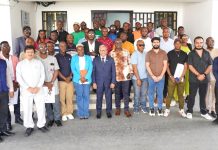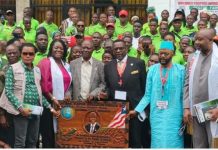Africa-Press – Liberia. The management of the Liberian education system has always been and continues to be a daunting task, due to the lack of adequate financial and logistical support to the Ministry of Education (MoE) and its collaborating entities, including the National Commission on Higher Education (NCHE).
It is well documented that the NCHE was founded in 1989 and that it is responsible to regulate and play a catalyst role for positive change and innovation for the delivery of quality university education in the country. But, this reflection is intended to weigh in on what the Commission can so far boast of in the past three years, beginning 2018, the accompanying challenges and, the promising future.
In a few weeks or months back, the Daily Observer and some other media outlets reported on the attempt by Senator Henrique Tokpah from Bong County to nullify the existence of the Commission through the enactment of a legislation and bring in its stead, the ministry of higher education as it is done in some African countries and elsewhere outside Africa.
For the record, Sen. Dr. Henrique Tokpah was President of Cuttington University (CU), the country’s second oldest university and he has been in the corridor of the education sector for decades prior to ascending to the Legislative seat.
He comes with a wealth of experience and understands the underlying factors responsible for the challenges within the education sector but, again, his call for a new ministry has met lots of mixed reactions, and to say it bluntly, resistance from his peers and many others on ground that the country lacks the financial mean to create a new ministry that would need structures with equal compelling demands.
Other reports have been development related, including the efforts made by the NCHE to get Liberian universities, colleges and grade schools on par with others in the subregion and overseas, mainly the United States of America, Great Britain, among others.
Let’s take a look at the NCHE from 2018/2019 fiscal year to 2020/2021 fiscal year; appropriations to it and what has or have been accomplished as well as what could or may not be accomplished:
Fiscal year 2018/2019
In this period under review, the National Commission on Higher Education (NCHE) had thirty nine (39) universities and colleges to supervise, accredit, and regulate and the membership of its staffs at the secretariat was thirty (30) while the budget from central government for its operations was US$313,814.00.
Fiscal Year 2019/2020
In this period under review, the number of universities and colleges became forty six (46) but the membership of the workforce remained the same. The same thirty staffs, including the director general had to do the work a lot more members of same qualified tecnicians and academics could do.
For its budget, it did not increase neither remain as it was in the previous fiscal year but dropped. The amount of US$285,812.00 was allotted for the function of the Commission, even though the number of higher institutions of learning increased.
This means, a deduction of US$28,002 was made, thereby leaving countless unanswered questions for a system that needs vibrancy and swiftness in its move to correct the already announced and known mess it is said to account for. Fiscal Year 2020/2021
This shocked even more rather than corrected the previous challenges. Instead of growth in budgetary allocation, a further decline was experienced. More challenging also was the reduction of the size of the workforce from thirty to twenty six, even though the number of institutions of higher learning grew up to fifty three (53).
The Ministry of Finance and Development Planning (MFDP) appropriated and submitted US$172,455.00 for operations, salaries and metenance of the NCHE. In calculation, a difference of US$141,359 between 2018/2019 and 2020/2021 is reported while US$113,357 stands out as the difference between 2019/2020 and 2020/2021.
There is an increase in the number of universities and colleges but a more reduction in the Commission’s budgetary allotment and its staffs. Is Liberia on its way to accomplishing any of the modern golden rules of quality service delivery and international recognition? The answer is obvious but it is with the pundits and, mainly those with the political will to change the narrative.
To run a robust and viable education system needs lots of support, mainly in funds and workforce. There is no way a credible monitoring would go on when there are no up to date logistics and enough competent manpower, well paid, to do the job.
The NCHE is understaffed and needs additional staff for proper supervision, monitoring, and quality control of the learning programs. There is a growing need for monitoring as the number of institutions increases.
Moreover, as Liberia now has international accreditation agencies joining the NCHE for accreditations, it has become imperative that the quality of workforce being provided by the NCHE appreciates to a higher level.
Does NCHE defend its own budget before the Senate as does Ministries and other agencies of government?
The answer, in its absolute and simplistic form is, “NO.” The Act establishing the Commission makes it an autonomous agency but operating under the auspices of the Ministry of Education.
This is why the Commission’s budget is a component of the Ministry of Education’s annual budget. Interestingsly also, the Minister of Education is the chairperson on the board of Commissioners of the National Commission on Higher Education.
For expediency’s sake, however, the Ministry of Finanace and Development Planning nowadays separates the NCHE’s allotment and delivers to it directly through an account at the Central Bank of Liberia (CBL) instead of passing it through the Ministry of Education. But I am informed, on the other hand, that the Minister of Education, who is the chairman on the board of NCHE, is consulted.
What has the NCHE achieved as of the beginning of the period under review?
The Commission stands a ground to justify ineffectiveness and lack of many success stories, but again, amid the turbulent fiscal and manapower challenges, there are successes.
In August 2019, there was introduced and now in force, a policy for licensing institutions to conduct post-secondary education and training in Liberia.
This effort has curbed the profiliferation of universities and colleges that do not meet the necessary requirements as provided for by the education laws and principles.
Nowadays, no new university or a college is accredited immediately upon its coming into existence or operation but licensed and monitored for a period of time for its compliance on quality control and better environment as well as trained, competent and qualified teachers/lecturers.
In January 2020, recommended quality assurance and physical facilities standards for tertiary institutions were put in place and to date, compliance to this policy accounts, to an extent, qualification for licensing or future accreditation.
Also, in May 2020, the E-Learning standards for higher education institutions in the country were introduced due to the outbreak of the Corona Virus which has prevented the overpopulation of campuses.
To date, the University of Liberia (UL), the African Methodist Episcopal University (AMEU), among a few others are implementing this policy. According to the policy, sixty percent of students’ learning should be done in physical classrooms while forty percent is done through the use of internet or online platforms.
Students at the state run University (UL), however, have protested against the E-Learning for what they termed as poor internet facilities and their (students) lack of resources to sustain the process.
Other success are from the perspectives of institutional capacity building. In April this year (2021), the NCHE, for the first time, introduced and Liberia’s higher education information management system (HEIMS).
The brnefits of this project are immense. To list a few, provision of quality higher education information (HEI) data to improve planning and quality decision making in higher education and help in tracking down irregularities and promote quality assurance in higher education.
Another benefit of the HEIMS is to afford the public the opportunity to verify the licenses and accreditation certifications of higher institutions through and by the NCHE and establishment of institution-based quality assurance units.
Interestingly also, there are now up-to-date lists of all degrees’ holders, ranging from “AA” to PhD in the country and all instructors/lecturers at all of the licensed and accredited institutions of higher learning are codedly enumerated in the data based system now owned and operated by the National commission on Higher Education.
This effort now in place, stands to help dinstinguish legitimate degree holders from those who are parading the corridors of the country with fake degrees. The effort is a plus for the law enforcement system of the country to help curtail the criminal act of claiming ownership to credentials one does not work for or deserves. Some part of April-June 2021;
The NCHE entered into mrmorandums of understanding (MOUs) with some foreign accreditation institutions, to include Accreditation Services for International Schools, Colleges and Universities (ASIC-UK) and International and Academic Management Association (IAMA-Indiana, USA) as well as the American International Accreditation Association (AIAA-New York, USA).
The MOUs are being reviwed and expected to be acted upon soon. Recently, the IAMA and the AIAA held a zoom conference with the NCHE and dialogued on the benefits to follow as well as the responsibilities of all parties involved.
Professor D. Ansu Sonii, Minsiter of Education of Liberia is the chairman of the NCHE board and he was a part of the meeting with the IAMA and the AIAA recently.
The nation’s Minister of Education has assured that a comprehensive review of the MOUs would be done and an action, as expected, be taken for the benefit of the Liberian education sector and the needed expansion network of the foreign Academic Institutions’ Accreditation agencies.
In addition to the institutional benefits, students from Liberia will have the opportunities to be accepted in American schools and others in the partnership deal without having to worry about starting all-over along the way in their academic sorjourn.
Retired foreign professors may come to Liberia and assist in improving the education system through the universities and colleges, among others. Another milestone achievement is that the NCHE has signed an MOU with an Egyptian company to introduce PraxiLabs in order to provide an unlimited access to science laboratories for Liberian Univeristies and colleges.
Following these efforts, discussions are also ongoing between the NCHE and the Liverpool University in England to launch the PhD program in Liberia. This means, the country would be on par with Ghana, Nigeria and other Countries in the subregion and overseas who are offering quality education in higher degrees. At present, there is no University in Liberia offering PhD, even though UL and Cuttingto have been in existence since the seventeen century.
Does the current team of the NCHE Secretariat deserve the opportunity to continue?
It is not me to say but there are a few things to consider as a decision would be made to determine who heads the Secrettariat of the Commission and who are those that should work with him or her.
First, Rev. Dr. James Andrew Lablah is the acting director of NCHE and he has been instrumental in seeing to it that the above listed achievements and a lot more not mentioned were realized.
However, as said above, the decision to make anyone head of the Secretariat of the NCHE lies in the purview of the board or the President of the Republic-now President George Manneh Weah.
But, let me hasten to borrow a few of the thoughts on this delicate concern from Senator Jim V. Tornola of Margibi County. Sen. Tornolah too is a scholar and has acquired higher credentials and is said to be closely following happenings within the NCHE and the Ministry of Education, too.
First and foremost, he was one of the main actors in ensuring that former NCHE director, Michael Slawon did not continue as Director General through the appointment accorded him by President Weah.
Tornolah said he was pleased that President Weah listened by not reappointing Dr. Michael Slawon to the post of director general of the NCHE Secretariat.
“Giving reasons to President Weah’s action, what I take cardinal to his decision is the respect for the “RULE of LAW.” He pledged to defend the Constitution of the Republic of Liberia. Knowing that the National Commission on Higher Education was established by an “Act” of the National Legislature of Liberia in 1989; the provision for selection of its members clearly spelt out within its “Act.”
It further expressed the selection of staffs for the Secretariat. That the power with authority for appointing staffs of the Secretariat is the sole authority of the Board of Commissioners. This, President Weah wouldn’t have flouted,” he shared with some education stakholders from among whom my source seeking anonymity allow me have this. Of course, Sen. Tornolah confirmed sharing this with a few friends and termed it as “harmless concern.”
The Margibi Senator added: “Besides, my position against Mr. Slawon’s nomination was not only based upon his scandal, but for the same fact that the rule of law must be upheld, being a stakeholder in higher education and a lawmaker as well. I needed to make my voice for the President not to be in error. If his predecessor did it wrongfully or unknowingly, he is in the rightful position to rectify those particular errors made, but not to continue in same. I think this should be one of the essences of change by the President so that it doesn’t appear as a rectorate to Liberians.”
He said that the Board of NCHE should be given the chance to decide on who becomes the next Director General of the Commission instead of the President.
He noted that he is not comfortable with the NCHE operating for so long a time under the supervision of an acting director general instead of director general proper.
“The works at the Secretariat of the NCHE are accelerating exceptionally, and the team there deserves to be given the needed support and motivation to continue working well, which is in the good interest of Liberia, and the Government of Liberia’s agenda. There is no doubt that the works of the Secretariat in recent times are unprecedented,” the Lawmaker further said.
He continued: “As I read a local daily yesterday, precisely the “Daily Observer”, there I followed budgets allotted to the NCHE within the previous three years and the level of works done by these guys. What I saw were fascinating to me, which I have decided to share with you, my dear colleagues and stakeholders:
“I realized that in 2018/2019, there were 39 universities and colleges accredited by the NCHE with only 30 clerical staff that included 3 technicians at the Secretariat, with an amount of US$313,814.00 allotted. Also, in 2019/2020 the institutions became 46 with the same number of staffs receiving a descending budgetary allotment of US$285,812.00. Furthermore, in 2020/2021, the institutions increased to 53 with a strangulated budgetary allotment of US$172,455.00. The last budgetary allotment ended in June of 2021, and you will not believe what is allotted for the next 5 months, which ends in December 2021. It is embarrassing to state it.”
He said it is unfortunate that NCHE has only one car to do its work as a Commission and due to what he has come to know, he is doing all he can to impress on the floor of the Plenary of the Senate to make better appropriation in the coming budget year for the NCHE’s effective operations.
Truth in his words, I followed up with the one car issue and it is confirmed that the NCHE is indeed operating with a single vehicle, not even all that faultless.
The Lawmaker added: “However, giving the monumental challenges faced by such a relevant institution in national development, regarding lack of logistics, low budgetary allotment, and inadequate human resource capacities, notwithstanding, you will be surprise by their exceptional achievements made.
“I think, as one of them puts it, it is out of the spirit of “Passion, Patriotism, Professionalism, and Purpose.” These are serious minded people I have come to know who we need to stand with firmly as stakeholders for the good of Liberia as they set for us an exemplary path.”
My investigation has uncovered that the benefit PraxiLabs bring are to provide access to Science Laboratory for an unlimited number of Liberian students and schools, reduce the burden of buying costly equipment needed for experiments, motivate students to learn science as well as allow them become innovative scientists, improving teaching and learning of the sciences, and to promote national development through research and technology applications.
This, I am told, will be used for both tertiary and secondary schools in Liberia. In fact, Senator Jim Tornolah has disclosed, and supported by the NCHE that Higher Education Stakeholders Conference is underway to relook at the agenda for the education sector in the country and work out corrective measures in order to meet the expectations of all of the international partners who want to see the Liberian education system become better and up to international standards.
He explained that there will be Curriculum harmonization and quality assurance, validating the Draft Act to repeal 1989 Higher Education Act, as well as making STEM education and TVET relevant in Liberia and validate Policy Guidelines on Financing Higher Education with priority program and scholarships by establishing standards for faculty ranking in collaboration with international accreditation organizations, establish standards for ranking institutions, and lay the basis for future conferences to keep higher educational activities constantly being reviewed and improved based on new ideas that would be discussed annually.
Tornolah appealed to the board of commissioners of NCHE to speedily appoint the new Director General of NCHE’s Secretariat in order to fulfill a major requirement of the 1989 Act of the Commission that has established it by law.
And, he hopes that the current team, with the acting leadership of Dr. James Andrew Lablah be given the opportunity to continue. Whether his views will count in this regard or not, the NCHE needs a proper leadership now, instead of anyone serving for a long time, as acting director general.






